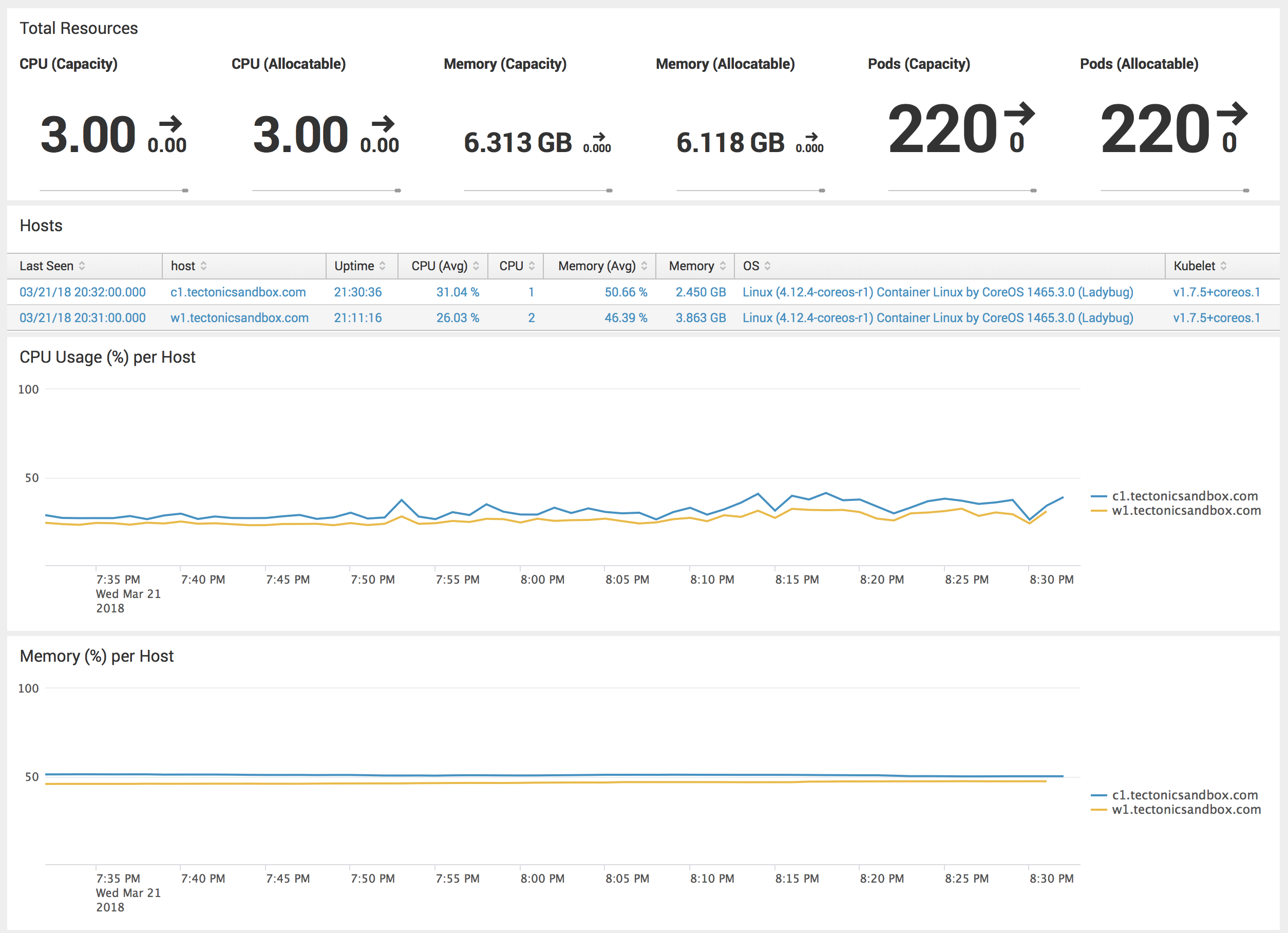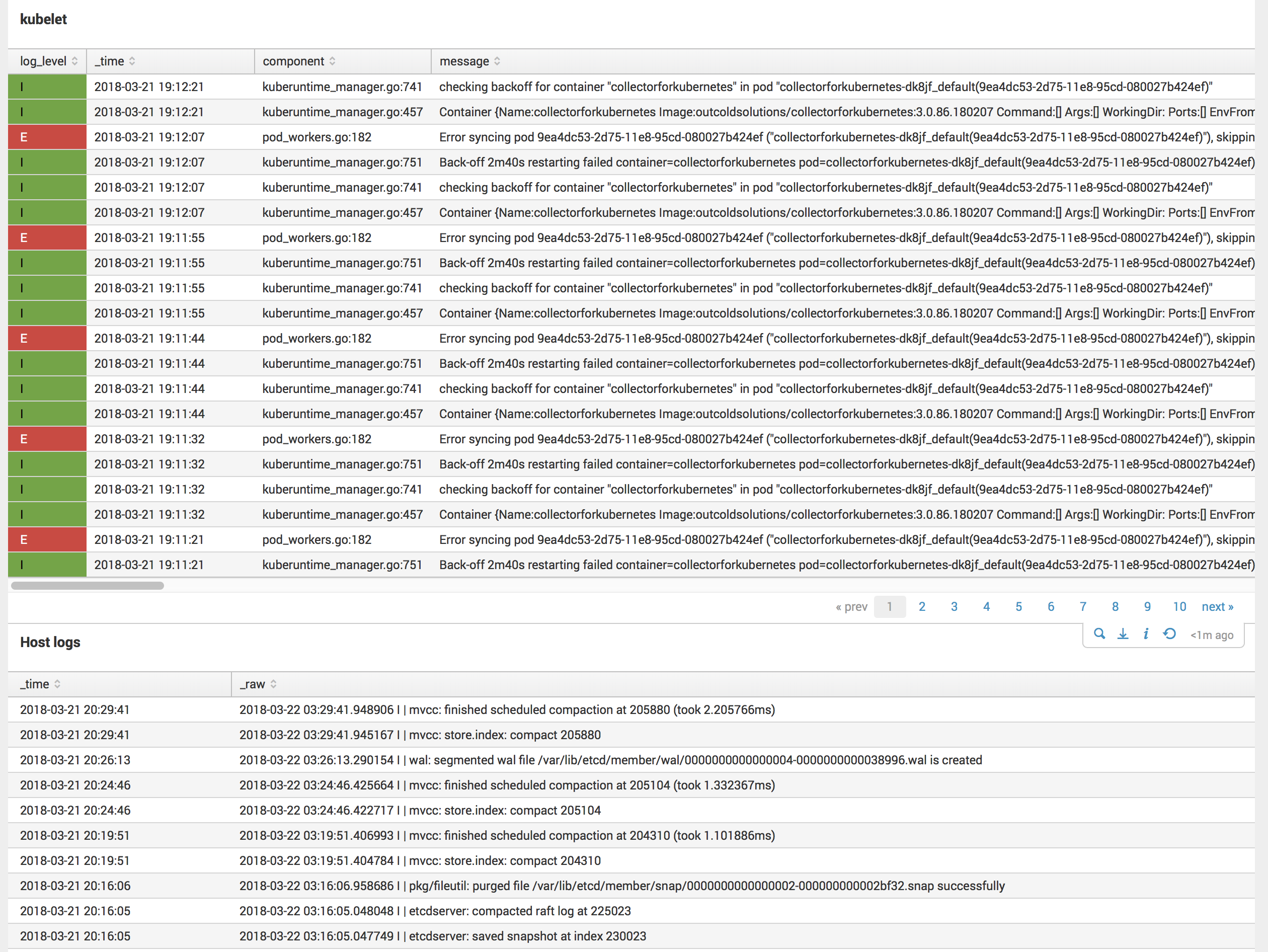Monitoring Tectonic in Splunk (Enterprise Kubernetes by CoreOS)
March 21, 2018tl;dr;
To install Monitoring Kubernetes solution on Tectonic
- Follow instructions on Monitoring Kubernetes to install collector and application.
- Install DaemonSet with rsyslog, which forwards journald logs to
/var/log/syslog.
kubectl apply -f https://raw.githubusercontent.com/outcoldsolutions/docker-journald-to-syslog/master/journald-to-syslog.yaml

Building Journald-To-Syslog image
Tectonic is the secure, automated, and hybrid enterprise Kubernetes platform. Built by CoreOS.
Our solutions for Monitoring Kubernetes works for most of the distributions of Kubernetes. And it works for Tectonic as well. It just requires small help to get the host logs.
Tectonic is using CoreOS as a host Linux for containers. CoreOS is very lightweight Linux, that does not provide package manager and require you to install additional software with containers.
CoreOS by default writes all host logs to the journald, which stores them in binary format. In most distributions,
like RHEL, we recommend installing rsyslog which automatically configures streaming of all logs from journald to
/var/log/. For CoreOS we should do the same, the only difference we will need to install it inside the container.
For the image outcoldsolutions/journald-to-syslog I choose
debian:stretch as a base image for a simple reason. It has the right version of journalctl, built with the right set of libraries.
If you will ssh to one of your CoreOS boxes, you will find out that it journald was built with +LZ4 and it is
probably using it as a default.
$ journalctl --version systemd 233 +PAM +AUDIT +SELINUX +IMA -APPARMOR +SMACK -SYSVINIT +UTMP +LIBCRYPTSETUP +GCRYPT -GNUTLS -ACL +XZ +LZ4 +SECCOMP +BLKID -ELFUTILS +KMOD -IDN default-hierarchy=legacy
For example ubuntu does not have +LZ4
$ docker run --rm ubuntu journalctl --version
systemd 229
+PAM +AUDIT +SELINUX +IMA +APPARMOR +SMACK +SYSVINIT +UTMP +LIBCRYPTSETUP +GCRYPT +GNUTLS +ACL +XZ -LZ4 +SECCOMP +BLKID +ELFUTILS +KMOD -IDN
But debian has it
$ docker run --rm debian bash -c 'apt-get update && apt-get install -y systemd && journalctl --version' systemd 232 +PAM +AUDIT +SELINUX +IMA +APPARMOR +SMACK +SYSVINIT +UTMP +LIBCRYPTSETUP +GCRYPT +GNUTLS +ACL +XZ +LZ4 +SECCOMP +BLKID +ELFUTILS +KMOD +IDN
If you will decide to build your image to forward logs from journald to syslog, make sure to check the compatibility.
You can test it by running journalctl -f over the journal files from your host Linux
docker run --rm -it \ -v /var/log/journal/:/var/log/journal/:ro \ -v /etc/machine-id:/etc/machine-id:ro \ debian \ bash -c 'apt-get update && apt-get install -y systemd && journalctl -f'
Inside Journald-To-Syslog image
rsyslog
I used rsyslog with imjournal to build
this image. As an alternative, you can use syslog-ng with systemd-journal
source.
The configuration I use for rsyslog
1 2 3 4 | $ActionFileDefaultTemplate RSYSLOG_TraditionalFileFormat module(load="imjournal" StateFile="/rootfs/var/log/syslog.statefile") $outchannel log_rotation, /rootfs/var/log/syslog, 10485760, /usr/bin/logrotate.sh *.* :omfile:$log_rotation |
Where
- Just a default format for the syslog file output.
- Load journal logs and use the state file
/rootfs/var/log/syslog.statefilein case of this container will restart. - Create the output channel as a
/rootfs/var/log/syslogfile, and call/usr/bin/logrotate.shif file will be larger10Mb(10485760bytes). - Stream all data (in our case only journal logs) to the created channel from (3).
log rotation
A good thing about rsyslog is that it will take care of when to call log rotation. We just need to configure logrotate.
For that, I have created a bash script
#!/bin/bash
/usr/sbin/logrotate /etc/journald-to-syslog/logrotate.conf
And default configuration to keep five rotated files and rotate when file size is more than 10M (should be in sync
with the size we used in rsyslog.conf).
/rootfs/var/log/syslog {
rotate 5
create
size 10M
}
entrypoint.sh
To make sure that rsyslog will use the right hostname, and not the one autogenerated by docker, I also created an
entrypoint.sh which can set the right hostname before it will start rsyslogd in the foreground.
1 2 3 4 5 6 7 8 9 10 | #!/bin/bash if [[ -z "${KUBERNETES_NODENAME}" ]]; then hostname $(cat /etc/hostname) else hostname "${KUBERNETES_NODENAME}" fi /usr/sbin/rsyslogd -f /etc/journald-to-syslog/rsyslog.conf -n |
K8S configuration: journald-to-syslog.yaml
The last step is to schedule journald-to-syslog container. We will schedule it on every Kubernetes node with the
DaemonSet workload.
1 2 3 4 5 6 7 8 9 10 11 12 13 14 15 16 17 18 19 20 21 22 23 24 25 26 27 28 29 30 31 32 33 34 35 36 37 38 39 40 41 42 43 44 45 46 47 48 49 50 51 52 53 54 55 56 57 58 59 60 61 62 | apiVersion: extensions/v1beta1 kind: DaemonSet metadata: name: journald-to-syslog labels: app: journald-to-syslog spec: updateStrategy: type: RollingUpdate selector: matchLabels: daemon: journald-to-syslog template: metadata: name: journald-to-syslog labels: daemon: journald-to-syslog spec: tolerations: - operator: "Exists" effect: "NoSchedule" - operator: "Exists" effect: "NoExecute" containers: - name: journald-to-syslog image: outcoldsolutions/journald-to-syslog securityContext: privileged: true resources: limits: cpu: 1 memory: 128Mi requests: cpu: 50m memory: 32Mi volumeMounts: - name: machine-id mountPath: /etc/machine-id readOnly: true - name: hostname mountPath: /etc/hostname readOnly: true - name: journal mountPath: /var/log/journal readOnly: true - name: var-log mountPath: /rootfs/var/log/ volumes: - name: machine-id hostPath: path: /etc/machine-id - name: hostname hostPath: path: /etc/hostname - name: var-log hostPath: path: /var/log - name: journal hostPath: path: /var/log/journal |
Few highlights:
line 23allows us to schedule this DaemonSet on masters as well.line 38tells journald the right ID, where to look for the journal logs.line 41helps us to know the hostname of the host Linux.
Splunk and Monitoring Kubernetes application
If you have not done that yet, you can install collector and our application in Splunk by following our manual on How to get started with Kubernetes.
One small modification is required for Monitoring Kubernetes v3.0 is to change in macro_kubernetes_host_logs_kubelet
from syslog_component::kubelet to syslog_component::kubelet*, as in case of Tectonic kubelet process is called
kubelet-wrapper.
You can do that in Settings → Advanced Search → Search marcos, modify macro_kubernetes_host_logs_kubelet to
(`macro_kubernetes_host_logs` AND (syslog_component::kubelet* OR source="*/kubelet.log*"))
After that, you should be able to see host logs, including kubelet logs




